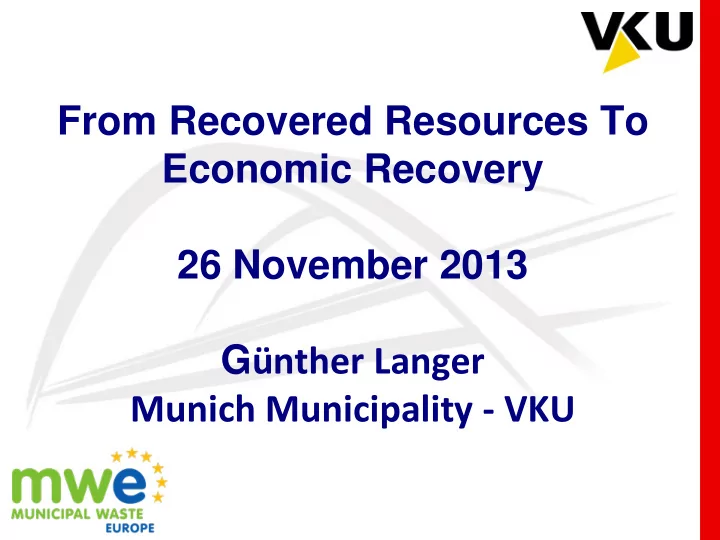

From Recovered Resources To Economic Recovery 26 November 2013 G ünther Langer Munich Municipality - VKU
Waste Management in the Memberstates 100% 90% 80% 70% 60% 50% 40% 30% 20% 10% 0% Landfill Incineration Energy Recovery Recycling Composting
Legal Regulations: Waste Management is a Service of General Economic Interest (SGEI) • EU-Legislation: Waste Framework Directive Treaty of Lisbon • German Legislation: Closed Cycle Management Act (Paragraph 20) • Bavarian State Law: Bayerisches Abfallgesetz (Article 3)
Collection of Household Waste in Germany Market Share of Municipal Enterprises about 39 %
Cooperation Between the City of Munich and the German Dual Systems
Household Waste Management Plan
Offers for Separate Collection in Munich 1,32 Mio. 1000 container 52 stops of the 12 recycling yards, 1 waste incinerator 1 waste disposal area inhabitans in 741.000 (Duales System hazardous waste open 60 hours Münchner Straße 22 (Freimann) households Deutschland) collection truck, per week 85774 Unterföhring W.-Heisenb.-Allee 62 every 4 weeks for 80939 München 1 hour – waste for energy – biowaste treatment carbside collection in the street in the street enclosure – residual waste about 200 m about 2000 m about 3000 m recovery plant – paper waste – glass – hazardous waste – hazardous waste – combined heat and – soil processing plant – organic waste – metal – recyclable material – interim storage for power production – bulky waste and – plastic – bulky waste waste for enercy – garden waste refrigerators recovery per order
Waste Management Corporation Munich facts & figures • Public service corporation run by the City of Munich • 1,411 employees from 23 nations • 149 collection crews with 773 collectors • 177 compression vehicles • 182 million € annual turnover • 3 work yards and 12 recycling yards • Combined heat and power waste incinerator • Waste disposal site (closed landfill) with biowaste treatment facility
Dry fermententation plant: facts & figures • Number of fermenters: 4 fermenters at previous pilot facility and 6 fermenters at new facility (built in 2007) • Capacity: rated capacity: 25,000 t/year • Utilisation 2012: 21,500 t (accounting for maintenance operations) • Amount of digestate: 17,000 t • Energy output: 2,300 MWh elec. • Compost output: 6,873 t • Greenhouse gas reduction: 1,930 t
Waste Incineration Plant at Munich North – Using Combined Heat and Power Generation • 680,000 t rated capacity • 615,004 t of waste incinerated in 2012 • 81,753 MWh of electrical power produced • 735,774 MWh of heat for district heating produced • 70,100 t greenhouse gas reduction
Recycling Rate in Munich Recycling 1 %Landfill Energy Utilisation - Organic - Garden Waste - Residual Waste - Paper/ Card- - Bulky Waste 55 % 44 % board - Mixed Waste - Glass/ Metal from - Packaging Construction - WEE Sites - Used Textile - Treated Wood - Slag
Contract Design of the Waste Fee is one Step on the Road to Sucess • Under German Legislation municipalities are commissioned and authorised to rise a waste fee • AWM invoices directly from the ground landlord • AWM demands the fee for the grey bin only • All other services of the AWM are free of charge and included in the grey bins fee • The amount of the fee depends on the size of the bin • If people separate waste correctly, they can use a smaller grey bin to spare money
The Waste Fee Provides the Following Services • Collection of the bins for residual, paper and organic waste • Use of the Recyclig Centers for 30 different waste fractions • Collection of hazardous waste • Collection of christmas trees • Information material • Consulting and awareness campaigns • Providing the waste collection bins (13 different sizes) • Rearrangement of waste bins • Call-Center
Benefits of Local Public Utilities in Germany Local public utilities offer maximum reliability Fees stability rather than profit maximization Guarantee for safe disposal High level of expertise ensures good quality Local public utilities guarantee sustainable development Climate and resource protection Only local public utilities provide for waste prevention Ensure a quality recycling Waste management is a regional task Important economic factor on site Partner of SMEs in the region Waste recycling and disposal facilities without long transportation
Benefits of Local Public Utilities in Germany Local public utilities bring more competition Local public utilities are an important market regulative Local public utilities the formation of monopolies Local public utilities realize low transaction costs Local public utilities take their social responsibilities Collective agreements for all employees High health and safety standards Cooperation with social projects Local public utilities secure citizen value instead of shareholder value The same services to all - no cherry-picking Socially acceptable fees Citizens benefit from the successful economies of local businesses
Günther Langer Landeshauptstadt München Abfallwirtschaftsbetrieb München AWM Büro der Werkleitung Georg- Brauchle- Ring 29 80992 München Telefon: +49 89 233-31007 Fax: +49 89 233-31205 E-Mail : guenther.langer@muenchen.de www.awm-muenchen.de
Recommend
More recommend